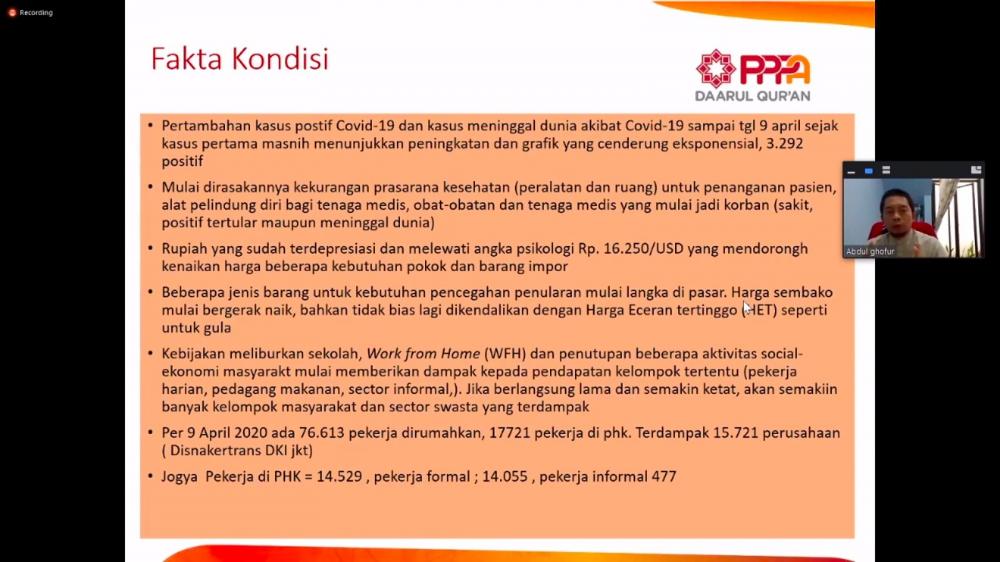Social Safety Nets for Poor Families Amidst the Covid-19 Pandemic

The second installment of the Webinar Series (Series #2) was held on Friday, April 10, 2020, from 2:00 PM to 3:30 PM WIB. The moderator for Webinar Series #2 was Mr. Mukhamad Yazid Affandi, M. Ag., Head of the Sharia Financial Management Program at UIN Sunan Kalijaga. The guest speaker for this webinar was Mr. Abdul Ghofur, the Chief Executive of PPPA Darul Quran. The theme for Webinar Series #2 was 'Social Safety Nets and Protection for Poor Families Amidst the Covid-19 Pandemic.' The moderator opened the webinar by highlighting the economic impacts of Covid-19 in Yogyakarta, including a decline in people's purchasing power and a surge in unemployment.
During Webinar Series #2, the speaker provided an overview of the Covid-19 situation as of April 9, 2020, with 3,293 confirmed cases and 280 deaths. The exponential growth in cases indicated a severe crisis. The health sector faced challenges, including a lack of infrastructure, equipment, and protective gear for medical personnel, resulting in healthcare workers becoming victims of the pandemic. The health crisis spilled over into economic difficulties, such as the depreciation of the Indonesian Rupiah, which crossed the psychological threshold of Rp16,250 per USD. This depreciation could lead to increased prices of essential goods and imported items. Additionally, a significant number of workers were furloughed or laid off, with 76,613 furloughed and 15,721 laid off as of April 9, 2020. In Yogyakarta, 14,529 workers were laid off, consisting of 14,055 formal workers and 477 informal workers. The speaker also presented various philanthropic models with scenarios predicting the impact of the pandemic, some suggesting it might last until September or the end of 2020.
The government allocated Rp405 trillion for Covid-19 handling, with Rp110 trillion specifically for social safety nets. The challenge was ensuring the transparent and fair distribution of this fund to those in genuine need. Suggestions included increasing assistance for programs like the Family Hope Program (PKH) by 25% annually, raising the Staple Card assistance by 33%, doubling the funds for the Pre-Employment Card from Rp10 trillion to Rp20 trillion to cover around 5.6 million informal workers and micro-businesses. Other measures included a three-month electricity bill waiver for 24 million 450VA customers, a 50% discount for 7 million 900VA subsidized customers, and additional housing incentives for low-income housing construction up to Rp175,000. The pandemic had complex social impacts, including the release and entry of prisoners.
Social safety nets played a crucial role in aiding individuals, families, and communities facing hardships, especially during the pandemic. The safety nets were extended through collaborative efforts involving the government, volunteers, and philanthropic institutions or ZISWAF. The Jakarta government implemented Large-Scale Social Restrictions (PSBB), with other regions likely to follow suit. Prolonged PSBB could strain regions to sustain and rebuild the socio-economic lives of their communities. Jakarta residents had received aid, such as staple food, during the PSBB. In addition to physical health, mental and spiritual well-being was emphasized as vital for community resilience.
Philanthropic institutions were essential in supporting various sectors during the Covid-19 crisis. They adopted three zakat movement strategies: incubation, curation, and recession phases. During the incubation phase, they campaigned through social media about Covid-19, safe work practices, and healthy living. The curation phase involved disinfecting public areas, creating isolation spaces, and providing support for mental and physical health. In the recession phase, support was extended to both psychological and physical needs, contributing to the economic recovery of micro, small, and medium enterprises (UMKM) and bridging the gap between informal workers and UMKM.
PPPA Darul Quran, as an Islamic philanthropic institution, contributed to each phase. In the incubation phase, they conducted extensive socialization and education through social media and implemented Work From Home (WFH) policies and social distancing. The curation phase involved disinfection activities, distribution of Personal Protective Equipment (APD), ready-to-eat meals, online learning classes, and religious studies. In the recession phase, PPPA Darul Quran distributed staple foods to those affected by social distancing measures and provided economic empowerment assistance post-pandemic.
Authors: Amy Astriana, Aulia Nurul Safitri
